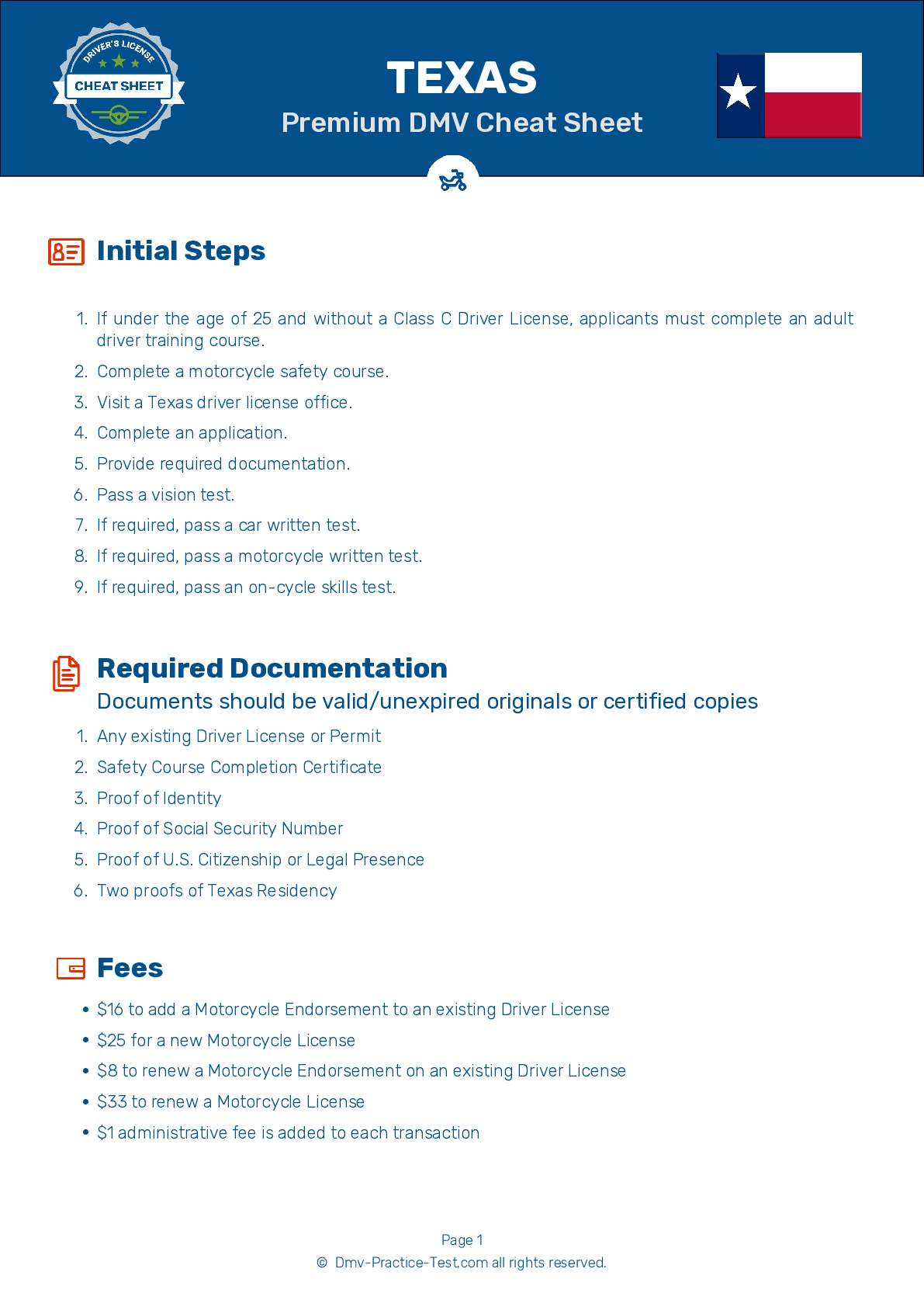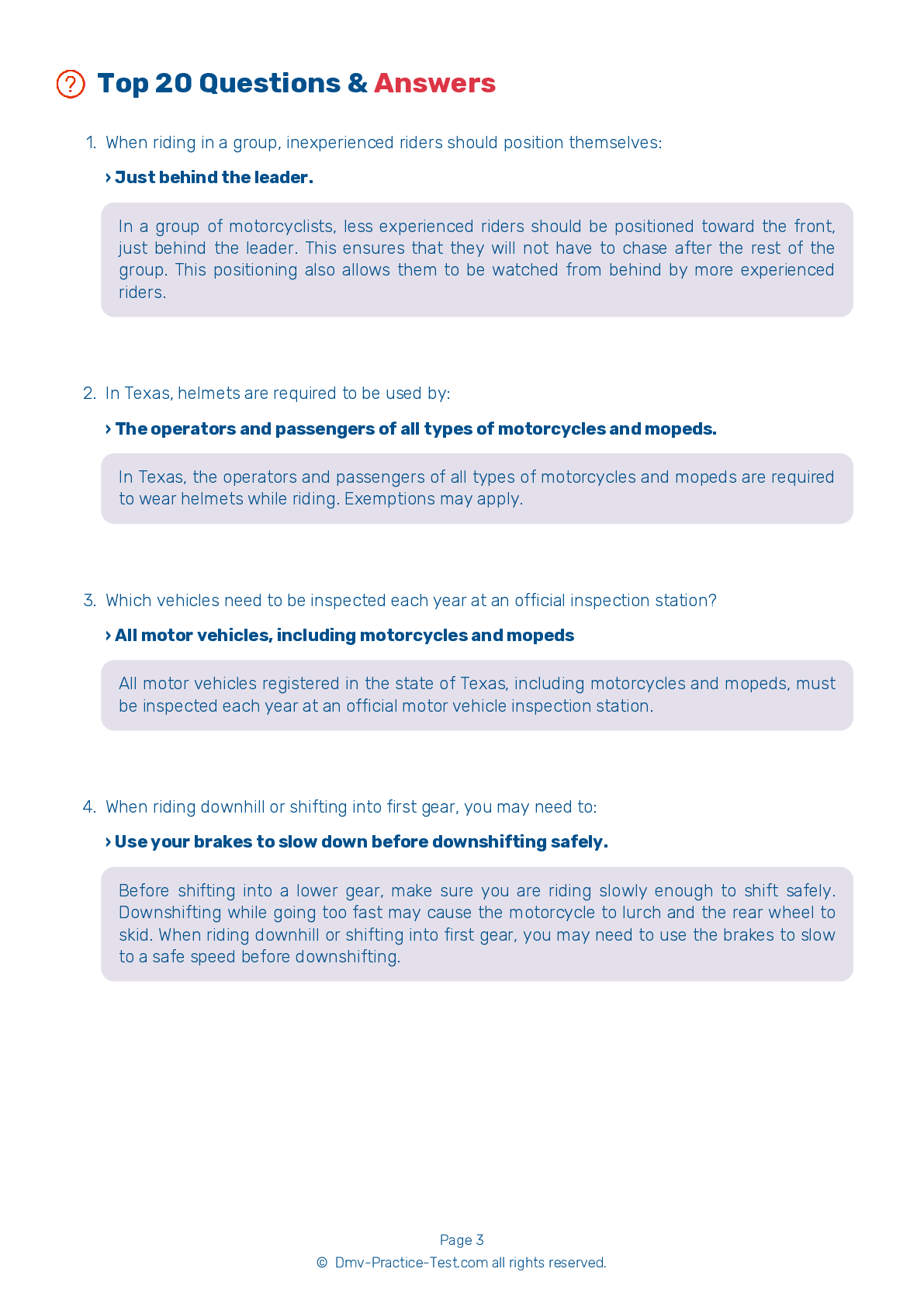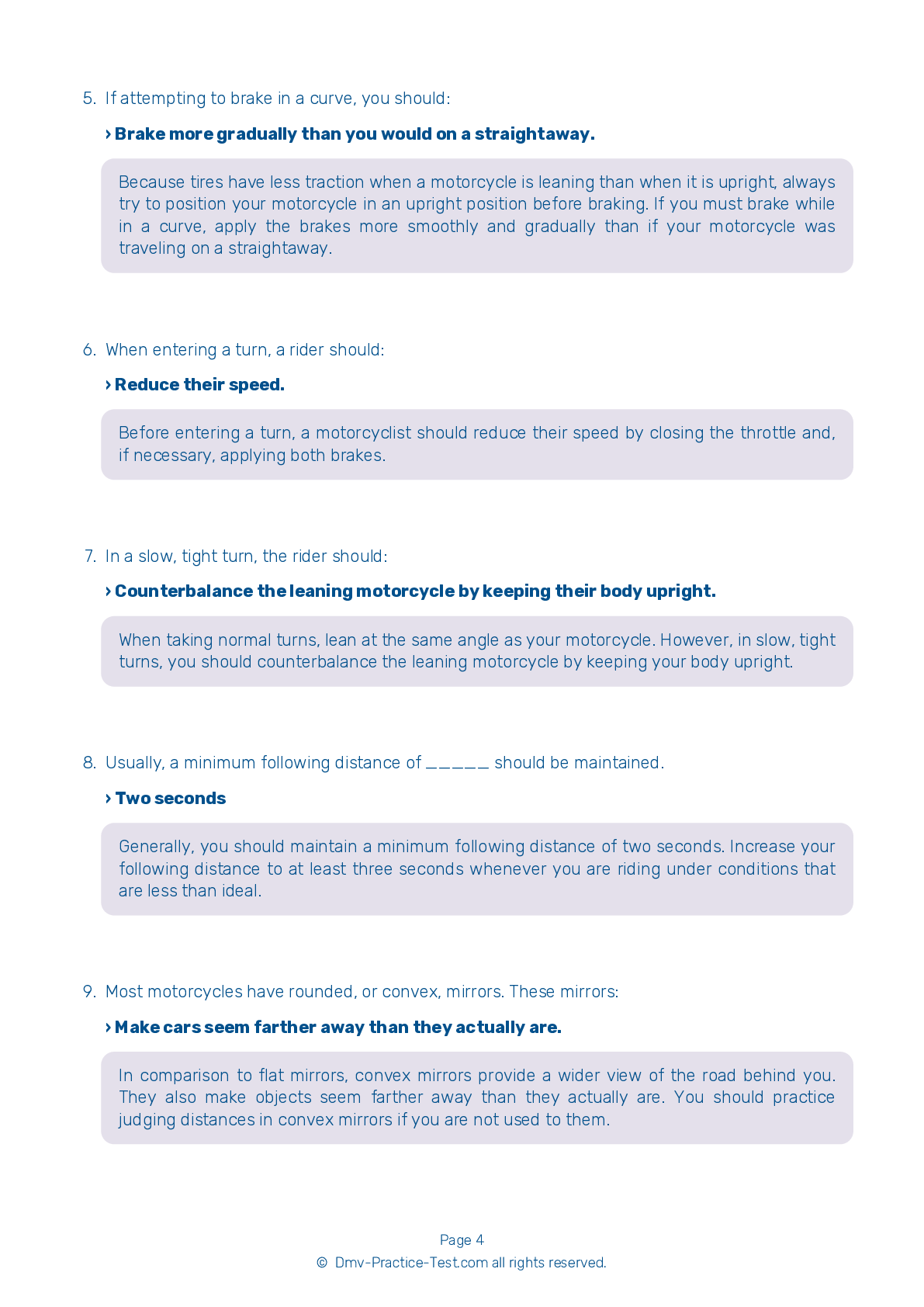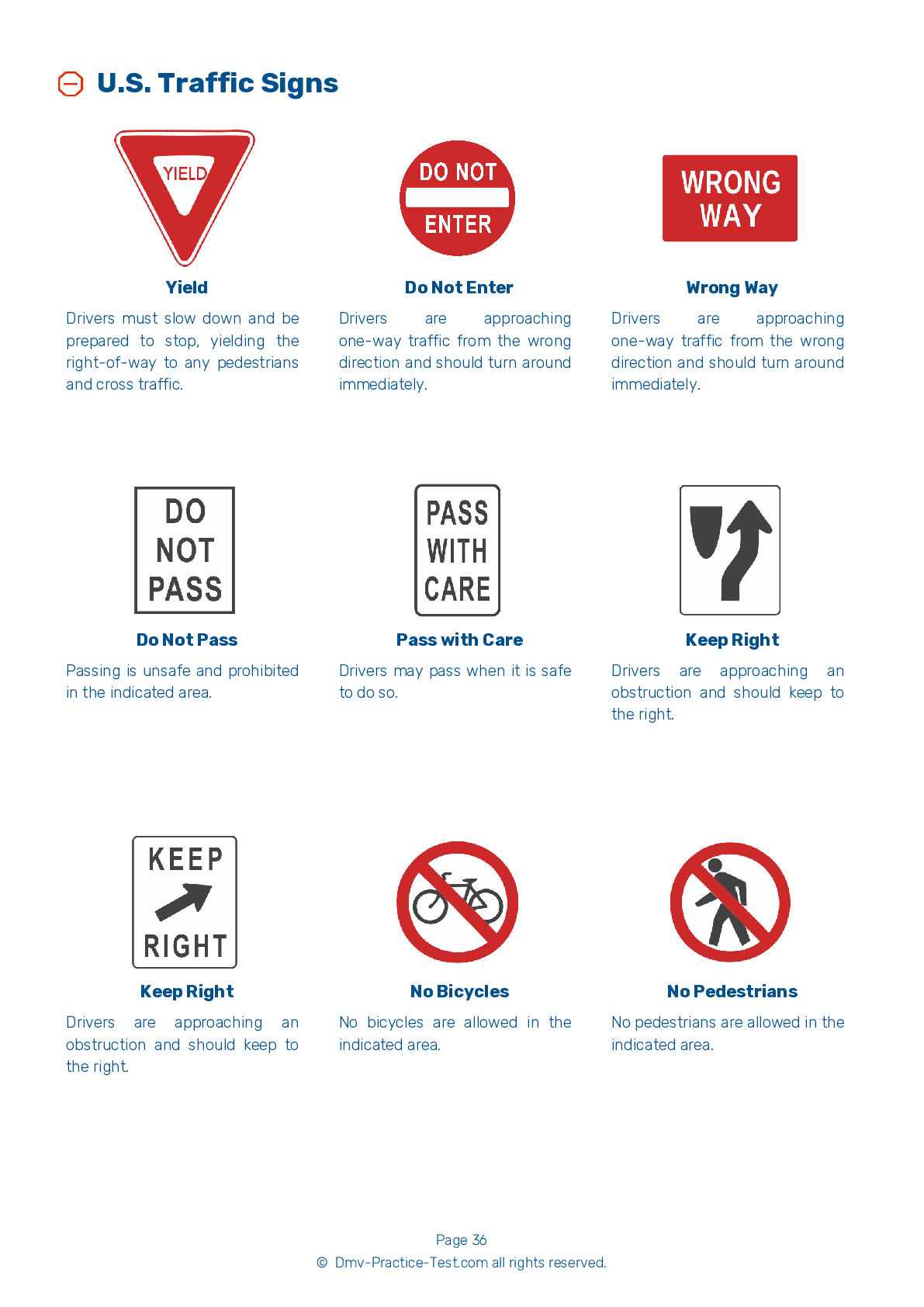DMV Permit Test #2
Motorcycle Test | License TX 2026 | FREE Online Practice! #2
Take this FREE motorcycle test (license in TX 2026) to check your knowledge of the road rules. To improve your results, download a motorcycle handbook online, study theory, and practice for free on our website. Still worried about how to get a motorcycle license in Texas in 2026? Check our website for more sample tests, train as much as possible, and boost your grades!
20
16
16
1 . Consequences for Driving While Intoxicated (DWI) may include:
All of the above.
If convicted of a DWI, you may face fines, license revocation, jail time, court costs, legal defense fees, community service, weekly appointments with a probation officer, mandatory rehabilitation program attendance, and increased insurance rates. If you have been drinking, it is best to stay off your motorcycle.
2 . You should usually position yourself in the portion of the lane where:
You are in another vehicle's blind spot.
You should most often position yourself in the portion of the lane where you are most likely to be seen and you can maintain a proper space cushion.
3 . The clothing you wear while riding should protect you from all of the following, except:
Dehydration.
The clothes you wear when riding a motorcycle should protect you from sunburn, windburn, rain, dehydration, cold, and parts of the motorcycle. Your clothing should provide you with additional protection in the case of a crash.
4 . Before every ride, you should:
Make sure you can see your helmet in your mirrors.
Perform safety checks before every motorcycle ride. Test your brake controls individually to make sure each one activates the brake lights.
5 . A linked braking system:
Connects the rear brake to a switch on the handlebar.
A linked braking system connects the front and rear brakes on a motorcycle. This system applies braking pressure to both brakes when either the front or rear lever is used. Check your owner's manual for a detailed explanation of the braking system on your motorcycle.
Need Motorcycle Insurance? No problem!
Compare the best rates in Texas and find a personalized policy that meets your needs.
1. Are You Currently insured ?
2. Married ?
3. Do you own your Home?
4. Have you or a Family Member Honorably Served in U.S. Military ?
5. Your Name
6. Age
7. Zip code
Ranked by best match
2026 Texas | Frequently Asked Questions
In Texas, to acquire a motorcycle license, you must first hold a valid Texas driver's license. Then, you'll need to successfully complete a Department of Public Safety-approved motorcycle operator training course. After that, submit your course completion certificate to the DPS, pass the written and driving tests, and pay the required fees.
In Texas, the minimum age for obtaining a motorcycle license is 16. However, if you're under 18, you'll also need to have completed a driver education course and the motorcycle operator training course, have a Class C provisional license, and provide a parental authorization form.
Yes, you do need a dedicated license for motorcycle riding in Texas. You must have a Class M motorcycle license or a motorcycle endorsement on your driver's license. To obtain this, you'll need to pass a written test, a vision test, and a motorcycle road test. Completion of an approved motorcycle operator training course can waive some of these requirements.
To apply for a motorcycle driver's license in Texas, you'll need to provide proof of identity (like a birth certificate or passport), proof of Social Security number, proof of Texas residency, and proof of U.S. citizenship or lawful presence status. Additionally, you'll need to complete the required motorcycle safety course and pass the written and driving tests.
Yes, in Texas, you will need to take a written exam to receive a motorcycle license unless you complete a Department of Public Safety-approved motorcycle operator training course. This exam tests your knowledge of Texas traffic laws and safe riding techniques. If you pass the course, both the written and driving test can be waived.
The motorcycle written test in Texas covers a range of topics, including motorcycle operation and handling, traffic laws, rider safety, and emergency situations. It also tests your knowledge on protective gear, passenger rules, and alcohol/drug effects on driving. The test's purpose is to ensure you understand the rules and safety measures necessary for motorcycle riding.
Yes, in Texas, successful completion of a Department of Public Safety-approved motorcycle operator training course can waive the written and driving tests required for motorcycle license endorsement. You'll receive a completion certificate from the course, which you can present at the DPS when applying for your motorcycle license.
In Texas, you can enroll in a motorcycle training course online or in-person at a Department of Public Safety-approved school. You'll need to fill out an application form, pay the course fee, and schedule your class dates. The class includes both classroom instruction and hands-on training. Upon completion, you'll receive a certificate to present when applying for your motorcycle license.
No, you do not need to own a motorcycle to take the license test in Texas. You can use any motorcycle as long as it is street-legal, registered, and insured. Additionally, the motorcycle should match the class of license you are applying for. Make sure to bring proof of insurance and registration for the motorcycle.
Yes, in Texas, you can use a friend's motorcycle for the driver's license evaluation. However, the motorcycle must be street-legal, registered, and insured. It should also match the class of motorcycle license you are applying for. Remember to bring proof of insurance and registration to your evaluation.
Yes, during the Texas motorcycle driving exam, specific handling skills are tested. These include but are not limited to: starting and stopping, turning and swerving, quick stops, and obstacle avoidance. The exam also tests knowledge of motorcycle controls, traffic laws, and safe riding practices. Proper gear and helmet usage are also evaluated.
Yes, in Texas, new motorcycle drivers under 18 are issued a provisional license. This comes with restrictions such as no driving between midnight and 5 a.m., no more than one passenger under 21, and no use of mobile devices while driving. These restrictions are removed once the driver turns 18.
Yes, your Texas motorcycle license is valid throughout the United States due to the Full Faith and Credit Clause of the U.S. Constitution. However, you must abide by the specific motorcycle laws of the state you're in, which may vary from those in Texas. Always check local laws when traveling out of state.
In Texas, motorcycle operators under 21 years old are required to wear a helmet. Those 21 and older can ride without a helmet if they complete a safety course or are covered by an applicable insurance plan. However, for safety reasons, it's highly recommended to wear a helmet regardless of age or insurance status.
Yes, Texas offers two types of motorcycle licenses: a Class M license and a Class M with a J restriction. The Class M license allows you to operate any type of motorcycle. The Class M with a J restriction is for mopeds and scooters only, limiting you to vehicles that do not exceed 50cc and cannot go over 30 mph.
Yes, you can add supplementary endorsements to your motorcycle license in Texas. These endorsements are additional privileges that allow you to operate specific types of motorcycles, such as those with three wheels. To add an endorsement, you will need to pass the necessary tests and pay an additional fee. Always check with the Texas Department of Public Safety for current requirements.
Yes, the Texas Department of Public Safety offers the motorcycle license test in multiple languages. However, it's recommended to contact your local DPS office in advance to confirm the availability of the test in your preferred language. This ensures you have the necessary accommodations for your test day.
A good strategy to prepare for the Texas motorcycle license test is to thoroughly study the Texas DPS Motorcycle Operator’s Manual, which covers all topics on the test. Practice exams are also available online. Additionally, consider enrolling in a motorcycle safety course, which will provide hands-on training and help you understand the rules of the road better.
Yes, the written motorcycle exam in Texas can be taken in languages other than English. The Department of Public Safety offers the exam in several languages, including Spanish. However, it's important to check with your local DPS office to confirm which languages they offer for the test. It's also advised to take a motorcycle safety course to prepare for the test.
If you don't pass the motorcycle written test in Texas, you are allowed to retake the test. However, if you fail three times, you must wait 90 days before retaking it. There may also be additional fees for each retake. It's recommended to study thoroughly using the Texas DPS Motorcycle Operator’s Manual to increase your chances of passing.



